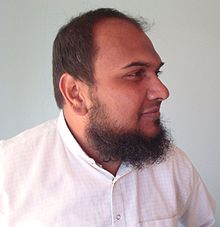- Niyaz Ahmed
-
Nizi Ahmed, Niyaz Ahmed, Niyaz A. Abdus-Samad Born December 25, 1971
Paras, IndiaNationality India Fields Bacterial Evolution and Genomics Institutions University of Hyderabad (2008 -) Universiti Malaya (2010 -) and Institute of Life Sciences, Hyderabad (2011 -) Alma mater Manipal University (Ph.D)
Niyaz Ahmed is an Indian professor of microbial sciences, a veterinarian by training, science blogger, and an Open Access advocate based in Hyderabad, India.[1]Contents
Training and career
Ahmed graduated in Veterinary Medicine in 1995 (Nagpur) and obtained further degrees in Animal Biotechnology (MS) (NDRI, Karnal) and Molecular Medicine (PhD) (Manipal University). He joined CDFD in Hyderabad as a tenured faculty member (Staff Scientist) in 1998. In December 2008 he moved to the University of Hyderabad as Associate Professor of Biotechnology and since then has been involved in graduate teaching and research supervision at the School of Life Sciences. Ahmed is also affiliated with the University of Malaya, Kuala Lumpur, Malaysia as an Adjunct Professor of Molecular Biosciences at the Institute of Biological Sciences. He also serves as Professor of Chemical Biology (Adjunct) at the Institute of Life Sciences Hyderabad, India.
Professional contributions
Ahmed serves as Section Editor (Genomics and Microbiology)[2] of PLoS ONE, published by the Public Library of Science (PLoS), USA. Currently, he is also providing editorial oversight to the "PLoS ONE Prokaryotic Genome Collection".[3] Ahmed also serves as a member of the PLoS International Advisory Group.[4] More recently, he became one of the Editors-in-Chief of Gut Pathogens,[5] published by BioMed Central Ltd. (London). Ahmed is a member of the International Society for Genomic and Evolutionary Microbiology (Italy) and currently serves as its General Secretary. He is also a member of the Faculty of 1000 Biology[6] and has been elected to the Indian National Academy of Sciences.[7] Ahmed served as an expert evaluator/panelist for the research proposals submitted to European Commission's Seventh Framework Program and the Skolkovo Foundation of the Russian Federation.
Graduate teaching and research
Ahmed teaches courses in 1) Molecular Biology (laboratory), 2) Genomics, 3) Biosafety and Intellectual Property and 4) Research Ethics and Management for Master's and Doctoral students, at the School of Life Sciences, University of Hyderabad. His current research interests include genomics, evolution and molecular pathogenesis of the two co-evolved human pathogens, namely, Mycobacterium tuberculosis and Helicobacter pylori, in the context of evolution of adaptation mechanisms, and acquisition and optimization of virulence during colonization/infection. Ahmed also has interest in comparative genomics of bacterial pathogens obtained from single patients at different occasions and this approach nurtures his concept of 'chronological evolution and replicative genomics' as tools to study host-microbe interaction over time. Ahmed's group has developed a widely used multilocus sequence typing scheme for species level identification of pathogenic Leptospira with a potential to replace the highly ambiguous serotyping method that currently is used for Leptospiral strain identification.[8]
Ahmed is also a Speaker of the International Graduate College - Functional molecular infection epidemiology - GRK1673, funded by the German Research Foundation (DFG), and heads the India arm of the GRK 1673.[9]
References
- ^ Home page of Dr Niyaz Ahmed
- ^ PLoS ONE Section Editors
- ^ PLoS ONE -Prokaryotic Genome Collection
- ^ PLoS International Advisory Group
- ^ Gut Pathogens Home Page
- ^ Faculty Member - Niyaz Ahmed
- ^ "The National Academy of Sciences, India - Life Members". 2009-10-05. http://nasi.nic.in/lifemem.asp. Retrieved 2009-10-05.
- ^ Ahmed, N.; Devi, S.; Valverde Mde, L.; Vijayachari, P.; Machang'u, R.; Ellis, W.; Hartskeerl, R. (2006). "Multilocus sequence typing method for identification and genotypic classification of pathogenic Leptospira species". Annals of clinical microbiology and antimicrobials 5: 28. doi:10.1186/1476-0711-5-28. PMC 1664579. PMID 17121682. http://www.pubmedcentral.nih.gov/articlerender.fcgi?tool=pmcentrez&artid=1664579.
- ^ GRK 1673
External links
Categories:- Indian scientists
- Science bloggers
- Living people
Wikimedia Foundation. 2010.

